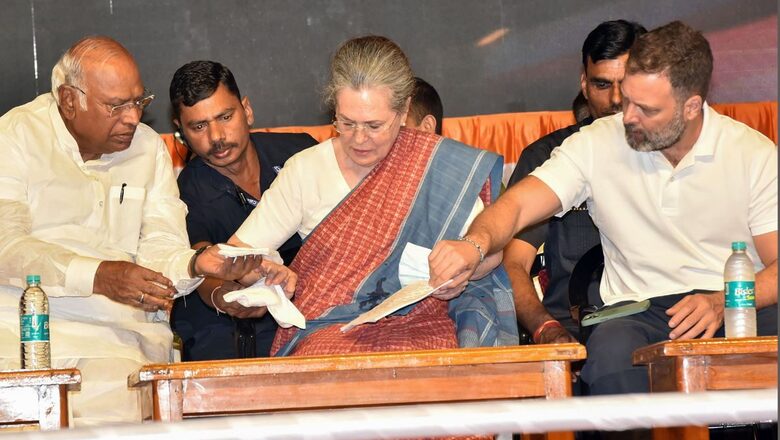
views
The horrific acts of terror in Israel have brought to the fore a stark contrast between the reactions of the government and the political Opposition. While Prime Minister Narendra Modi was forthright in taking a clear and unequivocal stance on the acts of terror committed in Israel, the principal Opposition Congress party chose to equivocate on the issue with a statement that was short of blaming Israel for having invited the acts of terror upon itself.
It is a puzzle why the principal Opposition chose to issue a statement on the events in Israel that puts it at odds with both the official stance of the government and a broad spectrum of public opinion within the country. The statement, however, must not come as a surprise given the continued drift of the Congress party over the past two decades towards causes espoused by a motley group of far Left activists with global patronage.
This drift that first began in the run-up to the 2004 general elections has now culminated in what can be best described as the ‘NGO-isation’ of India’s grand old party. Recent political remarks by the prime minister during an election speech on how the Congress has outsourced itself to certain NGO activists are an indication of the same. The roots of the ‘NGO-isation’ of the Congress can be traced to the latter years of the first NDA government, with the party finding a common cause with an assorted group of NGOs advocating for a rights-based agenda ranging from RTI and RTE to food security. Lying beneath the rights-based entitlement activism was however a far more sinister agenda that has since manifested in the Congress finding itself repeatedly on the wrong side of morality when it comes to taking an unequivocal stance on terrorism. From raising the false bogey of majoritarian terror in 2003 ahead of the then Madhya Pradesh state elections to blaming Hindu organisations for the 2008 26/11 attacks, assorted leaders of the Congress have scripted a playbook that has not only seen the party take up far Left causes, but also make common cause with them at the cost of national interest.
Early signs of convergence of interests between the Congress and leftist NGO activists are visible from the 2003 election in Madhya Pradesh when NGO activists decided to openly cast their lot with the party extending unconditional support to the then Digvijay Singh-led campaign in MP.
Smita Gupta, writing in Outlook in February 2022, detailed the broad spectrum of convergence between far Left politics, NGO activism and the principal Opposition. Interestingly, one of the protagonists mentioned in the Outlook article has recently been found on the wrong side of the law for running NewsClick, a website that has been found to be receiving funding from China-affiliated entities for advancing foreign propaganda.
There should be little doubt that underlying the nexus of convergence between NGO activism and the political Opposition are multiple sources of foreign patronage, both overt and covert. Reflective of this patronage was a recent caricature shared by the BJP’s social media wing on the role being played by billionaire George Soros to influence political outcomes in India. There is however a marked escalation between the degree of ‘NGO-isation’ during the UPA era and the current avatar of the Congress party.
While the National Advisory Council, chaired by Sonia Gandhi during the UPA years, was packed with Leftist NGO activists and the UPA regime ensured a series of rights-based entitlement legislative items were enacted into law, there was yet a nationalist streak within the Congress that championed the nuclear deal and stood up to Maoist terror. The current avatar of the Congress, however, seems to have completely ceded its agenda to the far Left NGO network of interests, with its pursuit of scorched earth politics in India while simultaneously undermining the Indian national interest through pronouncements inimical to the same.
With its divisive rhetoric of a caste census, the Congress party’s current drift not only threatens to cause irreparable damage to the social fabric of India but also carries the risk of derailing India’s economic growth story, reversing the growth momentum. It is paradoxical that the party that only recently claimed that India’s rise to be the world’s third-largest economy was inevitable is now actively pursuing an agenda to derail that rise.
From the success of the G20 Summit to the confident manner in which India stood resolutely to defend its national interest, there is a clear path today towards realising Prime Minister Narendra Modi’s vision of a Viksit Bharat by 2047. It is the time voters and the youth of India will realise this vision of a developed India and it is this Amrit Kaal Generation (Gen-AK) that has the highest stakes in the course India charts over the next two decades. It is thus imperative that the Amrit Kaal generation (Gen-AK) ask the question if their economic future ought to be jeopardised by the scorched earth politics being advanced by the principal opposition. It would also be pertinent to raise questions about the fitness of the current leadership, given the manner in which the agenda has been outsourced to a shadowy nexus of activists, some of whom are also recipients of foreign patronage.
By failing to take a clear stance on issues of national interest while actively seeking to undermine it with a “scorch the earth” agenda, this ‘NGO-ised’ avatar of the Congress party is sending the message to the Amrit Kaal generation that it does not share their dream and aspiration for a Viksit Bharat by 2047. It’s time the Amrit Kaal generation give a resounding reply to the ‘NGO-ised’ Congress leadership that this outsourced avatar of India’s grand old party with its myopic priorities is unfit to govern Bharat.
The writer is the former CEO, Prasar Bharti. Views expressed in the above piece are personal and solely that of the author. They do not necessarily reflect News18’s views.




















Comments
0 comment